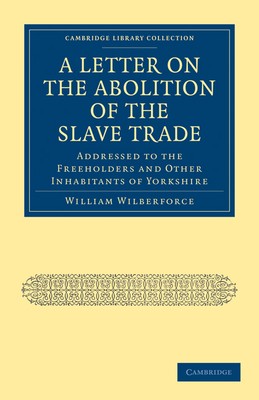
- We will send in 10–14 business days.
- Author: William Wilberforce
- Publisher: Cambridge University Press
- ISBN-10: 1108024998
- ISBN-13: 9781108024990
- Format: 14 x 21.3 x 3.3 cm, minkšti viršeliai
- Language: English
- SAVE -10% with code: EXTRA
Reviews
Description
William Wilberforce (1759-1833) was a politician, philanthropist and evangelical Christian, now best known for his work to end the slave trade. Elected to Parliament in 1780, he campaigned unsuccessfully for penal and electoral reform. In 1787, at the encouragement of William Pitt, he took up the cause of abolition at Westminster, but humanitarian and ethical arguments were slow to overcome the economic interests of those who had made fortunes from the slave trade or the use of slave labour. It was not until 1807 that the Abolition Bill was finally passed: shortly beforehand, Wilberforce had published this Letter to his constituents, justifying his preoccupation with abolition against claims that he was neglecting their local interests at Westminster, and setting out all his arguments against the slave trade. It is followed by his 1814 letter to Talleyrand, calling for a Europe-wide ban of the trade.
EXTRA 10 % discount with code: EXTRA
The promotion ends in 21d.03:57:21
The discount code is valid when purchasing from 10 €. Discounts do not stack.
- Author: William Wilberforce
- Publisher: Cambridge University Press
- ISBN-10: 1108024998
- ISBN-13: 9781108024990
- Format: 14 x 21.3 x 3.3 cm, minkšti viršeliai
- Language: English English
William Wilberforce (1759-1833) was a politician, philanthropist and evangelical Christian, now best known for his work to end the slave trade. Elected to Parliament in 1780, he campaigned unsuccessfully for penal and electoral reform. In 1787, at the encouragement of William Pitt, he took up the cause of abolition at Westminster, but humanitarian and ethical arguments were slow to overcome the economic interests of those who had made fortunes from the slave trade or the use of slave labour. It was not until 1807 that the Abolition Bill was finally passed: shortly beforehand, Wilberforce had published this Letter to his constituents, justifying his preoccupation with abolition against claims that he was neglecting their local interests at Westminster, and setting out all his arguments against the slave trade. It is followed by his 1814 letter to Talleyrand, calling for a Europe-wide ban of the trade.


Reviews